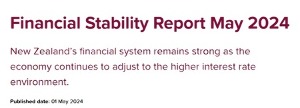RBNZ could impose DTIs on mortgage lending from July
The earliest the Reserve Bank is likely to impose debt-to-income (DTI) restrictions on bank mortgage lending is July this year, the central bank says in its latest financial stability report (FSR).
Wednesday, May 1st 2024, 9:59AM  1 Comment
1 Comment

RBNZ said it is currently reviewing submissions from its latest round of consultation and will announce its decision on DTI and loan-to-valuation-ratio (LVR) restrictions “around the middle of the year.”
Initially, RBNZ expects DTI restrictions are unlikely to affect most borrowers and that their introduction could allow the regulator to reduce LVRs.
“By activating DTI restrictions when the market is relatively subdued, it is likely that they will not be binding initially for most borrowers,” it said.
“Instead, DTI restrictions are intended to protect against increases in risky lending, especially when interest rates decline.”
While house prices have risen a little, they remain within sustainable levels, RBNZ said.
It noted that while financial markets have priced in lower interest rates over the next year, “there remains a risk that new or persistent inflation pressures could mean global interest rates remain restrictive for longer, placing continued pressure on households, businesses and the financial system.”
The FSR said most mortgage borrowers have rolled onto much higher interest rates and that we are now about 85% through the process to its projected peak – that's up from its 80% estimate in February.
“Only around 10% of mortgage lending remains on fixed rates below 4%,” it said.
The peak rate has increased to 6% from a low of 2.8% in 2021 and it will likely continue to increase to about 6.5% at about the end of this year.
“To date, the impacts of higher interest rates on the financial system have been more benign than generally expected,” RBNZ said.
“This is despite higher interest rates contributing to reduced economic activity, subdued credit growth across sectors, and house prices falling by around 15% between late 2021 and early 2023,” it said.
Mortgage arrears are rising from very low levels to about 0.5% of mortgages from 0.2% in 2022 and are expected to rise to about 0.7% by about the end of this year, but that will be just half the level experienced in the global financial crisis, it said.
“Arrears are expected to rise as some borrowers continue to roll onto even higher mortgage rates, albeit with the bulk of the transition already complete,” the FSR said.
“The impact of higher debt-servicing costs is also often only fully realised after some time as a strained borrower exhausts savings and other buffers.”
Borrowers have been able to cope by reducing the amount of principal they repay or by moving to interest-only payments, but the share of interest-only mortgages has remained flat at historically low levels, RBNZ said.
A softening labour market is likely to lead to increasing arrears but very few households are in a position of negative equity.
The FSR noted that non-bank deposit takers continue to face “scale and profitability challenges.”
| « Defendant pleads guilty in mortgage fraud scheme | Vincent Capital adds a South Island BDM » |
Special Offers
Comments from our readers
Sign In to add your comment
| Printable version | Email to a friend |




National MP Andrew Bayly when he was National’s Shadow treasurer in opposition back in late 2021 said the following.
“DTI limits would impose artificial restrictions on the amount banks can lend to home buyers based on their income."
"To anyone with even the most rudimentary understanding of how banking works, the outcome of such a rule should be obvious – the first people banks will cut lending to are those on low incomes, making it even harder than it already is for first home buyers to get onto the property ladder."
"The Government is supposed to be making things easier for first home buyers, not harder."
"The Reserve Bank has been tying itself in knots trying to pretend these tools are necessary for financial stability. Appearing before the Finance and Expenditure Select Committee today, Reserve Bank officials did such a poor job of defending DTIs, they gave the impression they were begging for them to be ruled out."
"The reality is Grant Robertson has been leaning on the bank to help hide the Government’s failure on housing. Making it harder for first-home buyers to borrow in a desperate attempt to get skyrocketing house prices out of the headlines is both cynical and wrong."
Fast forward to May 2024 now and this new Government needs to tell the academics at 2 The Terrace Wellington to stop their counter-productive meddling in the housing market. Mr Orr and the RBNZ already have egg on their face for keeping interest rates too low for too long causing house price inflation to skyrocket during the pandemic. DTIs are now the RBNZ's plan to clean up the mess that they caused previously.